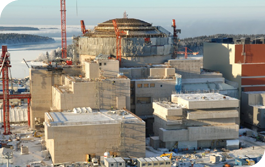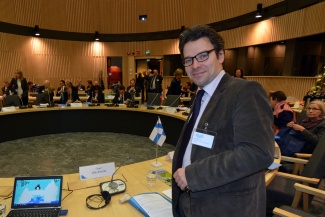
Bellona Launches Oslofjord Kelp Park
Bellona has launched the Oslofjord Kelp Park, a pilot kelp cultivation facility outside Slemmestad, about 30 kilometers southwest of Oslo, aimed at r...
News

Publish date: September 22, 2014
News
Finland’s ruling government coalition is on the brink of crumbling after as the head of the country’s Green League left the cabinet over its backing of a thorny, behind schedule, and likely dangerous Russian-backed nuclear reactor project in the country’s north, Finnish news outlets reported.
Finland is one of a handful of countries in Europe pursing new nuclear build outs, most of them in the European east, and many of them financed by Russia. The Pyhäjoki project, a mere 150 kilometers fro the Swedish border, has been a lightning rod of protests from those who fear a serious accident, as well as those who oppose it because Russia owns a 34 percent stake in it.
Spiraling costs, too, have caused major headaches. First slated as a $3 billion project to build the first European Pressurized Reactor (EPR), costs for finishing the Pyhäjoki have, as of April, topped $11 billion. The new cost projections and continuing delays caused the usually sober Finnish paper of record, Helsingnen Sanomat, to lampoon the project, comparing its cost with The Pyramids of Giza.

The government’s decision to back the new reactor – during a time of EU sanctions against Russia for its military aggression in Ukraine – prompted Green League leader Ville Niinistö and his party to exit the cabinet, leaving Prime Minister Alexander Stubb with threadbare support to make it though the next election.
Safety of reactor questioned
On Monday, Nils Bøhmer, Bellona’s managing director and nuclear physicist said the current Finnish-Russian reactor project was “as unrealistic as any other Finnish nuclear plan.”
He said that, should the reactor be completed, “there will be an energy surplus in the Nordic market for a long time,” which would drive prices for its energy down. Another problem, said Bøhmer, “the uncertainties linked to the price and startup dates.”
Bøhmer added that, “there are uncertainties linked to the safety of a Russian reactor design, which we know are developed under a different safety culture than in the West.
Peter Lund, a professor of Engineering Physics at Finland’s Aalto University agreed with Bøhmer, saying the new reactor type doesn’t meet western standards of safety, Lund told YLE Finnish Broadcasting.
“This Russian reactor is a new type of reactor and has not been built in Western countries,” Lund was quoted as saying. “There are no Western safety standards – I think the Russians have good technical skills, but their safety culture is a little different.”
Per Lundbäck of Sweden’s Nuclear Free Bothnia environmental group agreed, telling the Norrbotten Socialdemokraten newspaper that the EPR is nothing but a prototype for Russian state nuclear corporation Rosatom, and leaves questions such as how to handle it’s nuclear waste unanswered.
The Russian EPR is 1,200 MW reactors, dubbed by Rosatom as the AES-2006, and will be one of the largest reactors in the world, the Barents Observer news portal reported.
The reactor type is not running anywhere in the world today, but Russia plans to build a number of them at its Leningrad and Novovoronezh nuclear power plants.

Bad deals with Rosatom as sanctions loom
Nuclear power has been core to the energy mix for Eastern European nations since the 1980s, accounting for about one-third of total electricity generation in the Czech Republic and a touch less in Finland, over 50 percent in Hungary and 55 percent in Slovakia, according to the World Nuclear Association.
As sanctions against Russia, and Moscow’s retaliation, escalate, the current huge investments in nuclear’s future could crumble.
“It could happen that the EU sanctions are widened to including nuclear energy projects as well,” said Bøhmer.
George David Banks, Senior Fellow at the Center for Strategic and International Studies in Washington, agreed.
“The huge difference is that Russians see [nuclear projects] as a strategic asset and are willing to use taxpayer dollars to capture market share, which is different from what we’re seeing in Europe or the United States,” Banks told The Wall Street Journal.
This could spell trouble in several countries.
In June the Hungarian parliament approved a $13 billion Moscow-backed financing scheme to build nuclear reactors designed by Rosatom at the country’s Paks plant.
But Hungarian opposition politicians and environmental activists said the deal was preceded by little public debate and no public feasibility studies. They have asked the EU to look into whether the arrangement respects European legislation.
Russia’s largest lender, state-owned Sberbank, in June likewise inked a $1 billion lending facility for Slovakia’s utility Slovenske Elektrarne that will help finance construction of Russian-type nuclear reactors there.
But Rosatom’s chief spokesman, Sergei Novikov, tried to allay fears of tightening sanctions killing Rosatom’s Eastern European markets, and said he saw no delays in Finalnd and Hungary.
“For the moment everything is on time,” he told the paper.

Bellona has launched the Oslofjord Kelp Park, a pilot kelp cultivation facility outside Slemmestad, about 30 kilometers southwest of Oslo, aimed at r...

Our November Nuclear Digest by Bellona’s Environmental Transparency Center is out now. Here’s a quick taste of just three nuclear issues arising in U...

For three years now, Bellona has continued its work in exile from Vilnius, sustaining and expanding its analysis despite war, repression, and the collapse of international cooperation with Russia in the environmental and nuclear fields

The Board of the Bellona Foundation has appointed former Minister of Climate and the Environment Sveinung Rotevatn as Managing Director of Bellona No...